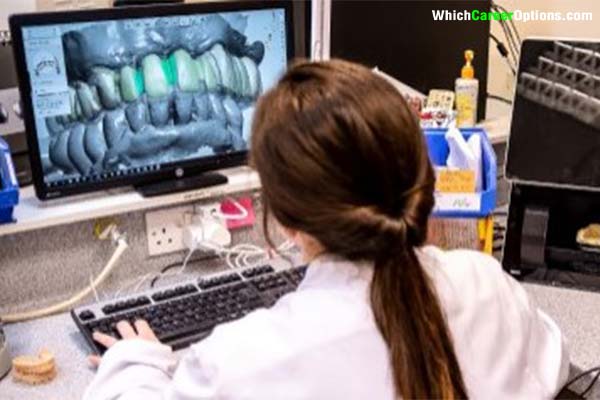Different Positions for a Dental Laboratory: A Complete Career Guide
Explore various dental laboratory positions, including key responsibilities, required skills, salary expectations, and career growth opportunities in dental technology.

Behind every perfect smile is a team of skilled dental laboratory professionals who create custom dental appliances with precision and artistry. If your career quiz results suggest you have strong technical skills, attention to detail, and enjoy hands-on work, a career in a dental laboratory could be your perfect fit.
This comprehensive guide explores the different positions for a dental laboratory, helping you understand the various roles, required qualifications, and career paths in this essential healthcare field.
What is a Dental Laboratory?
A dental laboratory is a specialized facility where dental technicians create custom dental prosthetics and appliances based on dentists’ prescriptions. These behind-the-scenes professionals work with various materials to manufacture:
- Crowns and bridges
- Dentures
- Dental implants
- Orthodontic appliances
- Veneers and other cosmetic devices
Key Positions in a Dental Laboratory
1. Dental Laboratory Technician
Primary Responsibilities:
- Creates dental prosthetics from impressions
- Works with metals, ceramics, and acrylics
- Uses CAD/CAM technology for digital dentistry
- Follows dentists’ prescriptions precisely
- Maintains quality control standards
Specializations:
- Fixed prosthodontics (crowns/bridges)
- Removable prosthodontics (dentures)
- Orthodontic appliances
- Implant restorations
2. Dental Ceramist
Primary Responsibilities:
- Specializes in porcelain work for crowns/veneers
- Hand-paints ceramics for natural tooth appearance
- Matches tooth color and translucency
- Works closely with cosmetic dentists
- Maintains artistic consistency
3. CAD/CAM Specialist
Primary Responsibilities:
- Operates digital scanning equipment
- Designs restorations using 3D modeling software
- Programs and monitors milling machines
- Maintains digital workflow systems
- Troubleshoots technical issues
4. Dental Laboratory Manager
Primary Responsibilities:
- Oversees daily laboratory operations
- Manages technician teams and workflow
- Handles client (dentist) relations
- Orders materials and maintains inventory
- Ensures regulatory compliance
5. Implant Specialist
Primary Responsibilities:
- Creates custom implant abutments
- Works with surgical guides
- Handles complex full-arch cases
- Coordinates with oral surgeons
- Maintains implant system certifications
How to Know If Dental Laboratory Work Is Right for You
Your career quiz may suggest this field if you:
✅ Enjoy detailed, precise handwork
✅ Have good color perception and artistic ability
✅ Like working with technology and materials
✅ Prefer behind-the-scenes healthcare roles
✅ Are patient and meticulous
✅ Enjoy solving technical challenges
Skills & Qualifications Needed
Education & Certifications
- High school diploma (minimum)
- Dental technology programs (1-2 years preferred)
- Certified Dental Technician (CDT) credential (NADL)
- State licensing (required in some regions)
- Manufacturer-specific certifications (for implants/CAD-CAM)
Essential Skills
✔ Fine motor skills and manual dexterity
✔ Color matching and artistic ability
✔ Technical drawing and spatial reasoning
✔ Basic computer skills (for digital dentistry)
✔ Knowledge of dental anatomy
✔ Quality focus and attention to detail
Typical Career Path in Dental Technology
| Career Stage | Position | Experience |
|---|---|---|
| Entry-Level | Laboratory Assistant | 0-1 year |
| Early Career | Dental Technician | 1-3 years |
| Mid-Career | Specialist Technician | 3-5 years |
| Senior-Level | Master Technician | 5+ years |
| Advanced | Laboratory Owner/Manager | 8+ years |
Salary Range & Job Outlook
- Dental Technicians: $35,000-$70,000 (BLS)
- CAD/CAM Specialists: $45,000-$85,000
- Laboratory Managers: $60,000-$100,000+
- Job Growth: 5-7% (2022-2032 projected)
Key Terms & Definitions
- Prosthodontics: Dental restoration/replacement
- Occlusion: How teeth come together
- Articulator: Device simulating jaw movement
- Wax-up: Preliminary model of restoration
- Digital Impression: 3D scan replacing molds
Tips for Starting a Dental Lab Career
🔹 Complete an accredited program for best opportunities
🔹 Gain experience in multiple specialties
🔹 Pursue CDT certification to advance your career
🔹 Develop digital dentistry skills – the field is evolving
🔹 Network with local dentists to build client relationships
FAQs About Dental Laboratory Careers
1. What’s the difference between a dentist and dental technician?
Dentists examine patients and prescribe treatment, while technicians create the prescribed appliances in the lab.
2. Is this a good career for artistic people?
Yes, especially for ceramists who blend art and science to create natural-looking teeth.
3. How has digital dentistry changed the field?
CAD/CAM technology has created new specialist roles while changing traditional techniques.
4. Can I open my own dental lab?
Yes, with sufficient experience and business knowledge, many technicians become lab owners.
Career Limitations to Consider
⚠ Can be repetitive work requiring sustained focus
⚠ Exposure to dust and chemicals requires safety precautions
⚠ Deadline pressures when dentists need urgent cases
⚠ Need for ongoing education as materials/techniques evolve
Final Thoughts
The different positions for a dental laboratory offer rewarding career paths for technically-skilled individuals who want to impact patients’ lives behind the scenes. If your quiz results highlight your precision, artistry, and interest in healthcare technology, explore dental laboratory careers today!
With an aging population and growing cosmetic dentistry demand, skilled dental technicians will remain essential to oral healthcare. Ready to craft perfect smiles? Research dental technology programs in your area!
